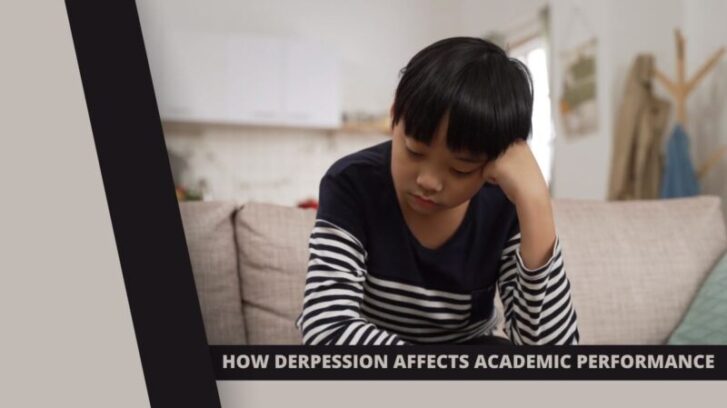Every person has a world of their own – an intricate network of thoughts, emotions, experiences, and challenges that shape their lives. Among these challenges, depression often remains unseen, underestimated, and misunderstood.
It’s like an undercurrent that flows beneath the surface of a person’s life, subtly yet profoundly impacting their every move. Despite affecting over 264 million people worldwide according to the World Health Organization, depression remains shrouded in stigma, particularly its significant impact on the academic performance of students.
Secondarily, addressing this problem is not only a matter of understanding the statistics but also recognizing the human beings behind these figures. Depression is a silent battle fought in the minds of many students. It affects not just their mental health, but every aspect of their life, especially their academic performance.
In the subsequent sections, we’ll delve into this issue in detail, demystifying depression, highlighting how it affects academic performance, and discussing potential solutions to aid those grappling with this mental health concern.
Definition
Before we delve into the impacts of depression on academic performance, it’s vital to develop a comprehensive understanding of depression itself. Depression is a common mental disorder characterized by persistent sadness, loss of interest in activities once enjoyed, and a lack of motivation. It affects individuals differently; symptoms can range from chronic fatigue and insomnia to feelings of worthlessness and suicidal thoughts.
Moreover, depression is not simply feeling ‘down’ or ‘sad.’ It’s a complex, debilitating condition that can affect every aspect of a person’s life, from their physical health to their relationships and work or performance.
It’s an issue that goes beyond mere emotional distress, causing significant impairments in daily functioning, cognitive capabilities, and overall well-being. One area that often remains overlooked, despite its widespread implications, is the influence of depression on academic performance, which we’ll explore in the following sections.
The Direct Impact of Depression on Academic Performance
Depression can drastically impact a student’s performance, and this comes down to its symptoms, which often align antithetically with what academic success requires. For instance, depression can result in difficulty concentrating, making it challenging for students to focus during lectures or while studying.
Similarly, students with depression may experience chronic fatigue, which makes it tough to engage in academic activities optimally.
In addition, depression can result in reduced motivation and a loss of interest in previously enjoyed activities, including studying. This can affect students’ engagement with their coursework, making it harder for them to keep up with assignments and effectively prepare for exams.
Chronic absenteeism, a frequent symptom of depression, can also exacerbate this issue. Missing lectures means missed learning opportunities, reinforcing the negative cycle of poor academic performance and depression.
The Indirect Impact
Beyond the direct consequences, depression can indirectly affect a student’s academic performance by exacerbating existing academic stressors. For instance, depression might make it harder for a student to handle the pressure of exams, leading to heightened anxiety, poor test performance, and a further deterioration in their mental health.
Moreover, depression can also influence a student’s social interactions, impairing their ability to participate in group projects or extracurricular activities. This can impact their academic performance, given that these interactions often provide valuable learning experiences and help in developing essential soft skills. Furthermore, depression can make it challenging for students to seek help, further isolating them and impeding their academic progress.
Identifying and Addressing the Problem
The impact of depression on performance cannot be overstated. However, it is possible to identify and address this problem effectively. The first step is awareness—recognizing the signs of depression and understanding its potential impact on a student’s academic life. These signs can include persistent sadness, loss of interest in daily activities, chronic fatigue, difficulty concentrating, and changes in sleep or eating habits.
From there, it’s crucial to create an environment that supports students grappling with depression. This can include offering counseling services, implementing mental health programs within academic institutions, and fostering an inclusive, non-judgemental culture that encourages students to seek help.
By taking these steps, we can not only help students manage their depression, bu also mitigate its impact on their academic performance.
The Role of Educators and Academic Institutions
Academic institutions and educators play a pivotal role in addressing the impact of depression on performance. It’s not just about imparting knowledge; it’s also about nurturing the well-being of students. Educators should be trained to recognize the signs of depression and understand its potential implications on a student’s academic life.
This can involve adjusting expectations, providing additional support, or referring students to appropriate mental health resources.
Moreover, academic institutions need to implement policies and programs that actively support mental health. This can range from on-campus counseling services and stress management workshops to accommodations for students struggling with depression.
By fostering an environment that recognizes and supports mental health, we can help mitigate the impact of depression on performance and cultivate a more inclusive, empathetic academic community.
Personal Responsibility and Self-Care
While external support is crucial, students must also learn the importance of personal responsibility and self-care when managing depression. This includes recognizing their feelings, seeking help when necessary, and implementing self-care practices into their routine. These might include regular exercise, a healthy diet, sufficient sleep, mindfulness or meditation, and spending time on hobbies and activities they enjoy.
Self-care also includes setting realistic academic expectations, balancing study time with relaxation, and not being too hard on oneself when things don’t go as planned. Remember, it’s okay not to be okay, and it’s okay to seek help.
By practicing self-care and taking personal responsibility for their mental health, students can better manage their depression and its impact on their academic performance.
Societal Changes and the Future of Academia
The conversation about depression and performance extends beyond the walls of schools and universities. As a society, we must address the stigma around mental health and encourage open, supportive dialogues about mental health struggles. This includes promoting mental health awareness in communities, pushing for policies that prioritize mental health, and reframing societal views on success and failure.
In the future, academic success should not merely be about grades or degrees. Instead, it should encompass a more holistic approach, taking into account the overall well-being of students.
With ongoing research, societal changes, and concerted efforts from all stakeholders, we can look forward to a future where depression and other mental health conditions are recognized and addressed effectively, ensuring a healthier, more supportive academic environment for all.
Conclusion
Depression is an invisible enemy that has a profound impact on a student’s performance. Yet, with awareness, understanding, and the right support systems in place, it is possible to counter this adversary effectively. By recognizing depression as a serious issue affecting the academic landscape, we can foster a more inclusive and supportive environment for all students, irrespective of the battles they may be fighting within.
In conclusion, while depression can indeed affect academic performance significantly, understanding this relationship can guide us in devising strategies to support affected students better. It’s about time we bring this conversation to the forefront, shedding light on the unseen struggles, and ensuring that no student has to face the battle alone. Remember, it’s not just about grades, but about fostering a healthy, holistic, and supportive learning environment for everyone.
Related Posts:
- Understanding How HGH Influences Mental Well-Being:…
- High Functioning Mental Health Disorders: Hidden…
- Overcoming Mental Health Struggles with PHP: Roadmap…
- Depression vs. Manic Depression: Battle of the Moods
- Gender Roles and Their Impact on Depression: Beyond…
- Symptoms, Causes and Effects of Chronic Depression:…
















